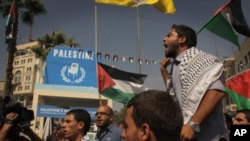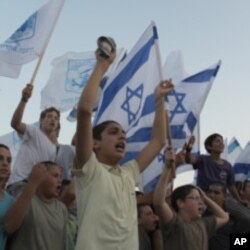|
Palestinian Statehood Bid Breakdown
|
Thousands of Palestinians gathered in the West Bank city of Ramallah Wednesday to show support of their leadership’s upcoming bid for full U.N. recognition.
The crowd marched from the grave of former Palestinian leader Yasser Arafat to the center of town, through Manara Square. Centered in the plaza was a giant-sized blue wooden chair symbolizing the the U.N. seat Palestinian President Mahmoud Abbas is expected to start seeking Friday.
Pro-statehood show of support
“We are here to support our country and our state,” said Reem Saleh, a project manager from Ramallah, waving a flag on the edge of the square drowned in a sea of hundreds of red, white, green and black Palestinian flags.
“This is important for our kids, for our future. To have independence, economics, everything,” shouted Saleh over music coming from a stage filled with dancers across the square.
“We are here to get back our hope after 20 years of useless negotiations and 18 years of failing Oslo [Accords],” said Mustafa Barghouthi, Secretary General of the Palestine National Initiative, also present at the rally. “Time has come for Palestine to be free.”
Barghouthi said the gathering shows not only support of the U.N., bid but also solidarity among all Palestinians. Should the U.S. use its veto to block the Palestinian bid, he added, not just Palestinians, but people across the region will question America’s motives.
“They claim they support democracy and freedom in Libya, Syria and Egypt. Why not for Palestine?” asked Barghouthi. “A year ago, in the United Nations, Obama said Palestine should be become a full member by September this year. Now, he’s not only taking it back, but he’s using a veto against what he said.”
In recent weeks, the Palestinian Authority has intensified a media campaign for their U.N. bid, including billboards, flags, t-shirts and the symbolic wooden chair. Many of the items bear the number 194, a reference to a U.N. resolution from December of 1948 that calls for peace among the then-warring nations, Israel’s withdrawal from occupied territories and the return of Palestinian refugees to their homes. The number also symbolizes that Palestine, if accepted, would become the 194th member country of the U.N.
Some dissenting voices
But not all Palestinians are rallying for statehood now. Seventeen-year-old Jamal AbuKhater, a student and blogger, is possibly one of the U.N. bid’s youngest critics. He tweeted live from the protest. “Flags are being distributed...bottles being distributed...all this for a fake Bantustan,” he tweeted, using the word for land that was set aside for black South Africans that is sometimes used in reference to the Palestinian territories. Although too young to vote, AbuKhater has been vocal online, criticizing what he calls the Palestinian Authority’s quest to establish a “Sovereign Bantustan.”
AbuKhater represents a less outspoken group that opposes Abbas’s bid. “Our struggle is not a struggle for symbolic statehood;” he writes in a blog post, “it is a struggle to gain Palestinians’ basic rights.”
Israeli settlers’ message
Palestinians are not the only ones who have organized to make their positions known. The last weeks have seen an increase in activity by Israeli settlers, who on Tuesday marched through the West Bank to advocate for their territorial claim.
From the settlement of Itamar - made famous earlier this year when five members of the Fogel family were killed in their home - around 200 settlers gathered, some dancing to music and waving Israeli flags.
“I’m here to walk on my land,” said Leah Goldsmith, a resident of Itamar and native of New York City. “It’s just telling the world, ‘Hey, we live here. We exist.’ While on the other side of the world in New York now people are deciding about this land, we’re saying, ‘Hello, here we are’.”
Some said the rally was more of a pre-emptive move.
“[The settlers] are reacting against all threats. Threats from the U.N, threats from the U.S., threats from the Israeli government,” said Ira Sharkansky, a professor of political science at Jerusalem’s Hebrew University. Sharkansky added that settlers are scared and reacting to fears that the Palestinian statehood bid will be successful, even though Sharkansky dismisses it as improbable.
But settlers, such as the ones in Itamar, are considered an extremist element by many in Israel and are not representative of Israeli society, cautioned Sharkansky. “They are troublemakers.”
But it’s also this segment of Israeli society that has a lot at stake in the outcome of U.N. deliberations on the Palestinian issue. For them, the question boils down to who will have authority over land they now consider theirs.
Goldsmith reasserts her claim about her settlement: “Itamar is only an hour from any place. It’s an hour from the airport, and hour from Jerusalem and an hour from Tel Aviv. It’s not some far away fairyland they make up - the West Bank. No, it’s the heart of Israel and it’s time for the world to realize it.”
Despite the attention the U.N. bid has drawn, many on both sides say a successful bid won’t result in drastic changes here.
“We understand that a vote [in New York] will not liberate us,” says Barghouthi of the potential of Palestinian success. “Liberty will be made here.”
And Sharkansky has a similar belief that U.N. General Assembly support will mean little. “Unless that causes the Palestinians to act violently, then we will all be in deep trouble because that will cause Israel to react violently,” he said, adding that, so far, Palestinian leaders have worked to keep things under control. “That’s the risk we face this weekend.”





